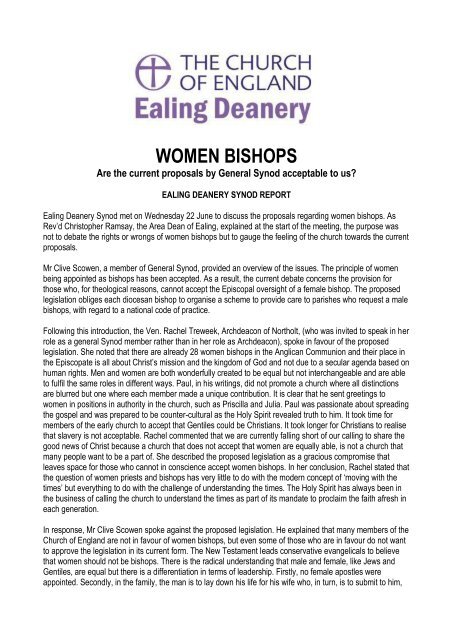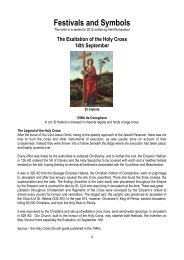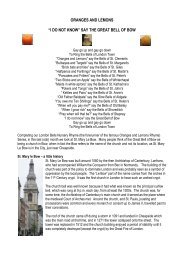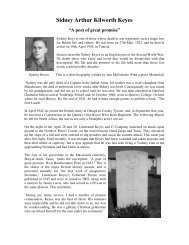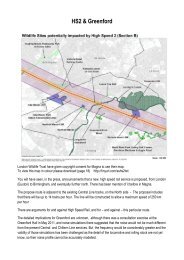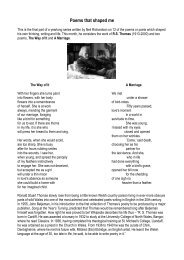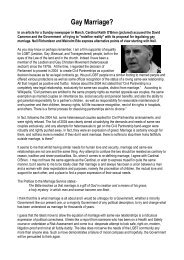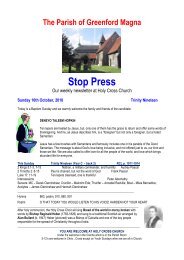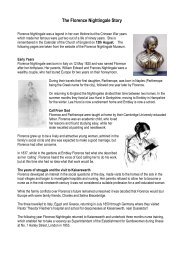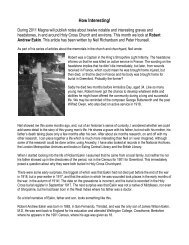WOMEN BISHOPS - The Parish of Greenford Magna
WOMEN BISHOPS - The Parish of Greenford Magna
WOMEN BISHOPS - The Parish of Greenford Magna
Create successful ePaper yourself
Turn your PDF publications into a flip-book with our unique Google optimized e-Paper software.
<strong>WOMEN</strong> <strong>BISHOPS</strong><br />
Are the current proposals by General Synod acceptable to us?<br />
EALING DEANERY SYNOD REPORT<br />
Ealing Deanery Synod met on Wednesday 22 June to discuss the proposals regarding women bishops. As<br />
Rev‟d Christopher Ramsay, the Area Dean <strong>of</strong> Ealing, explained at the start <strong>of</strong> the meeting, the purpose was<br />
not to debate the rights or wrongs <strong>of</strong> women bishops but to gauge the feeling <strong>of</strong> the church towards the current<br />
proposals.<br />
Mr Clive Scowen, a member <strong>of</strong> General Synod, provided an overview <strong>of</strong> the issues. <strong>The</strong> principle <strong>of</strong> women<br />
being appointed as bishops has been accepted. As a result, the current debate concerns the provision for<br />
those who, for theological reasons, cannot accept the Episcopal oversight <strong>of</strong> a female bishop. <strong>The</strong> proposed<br />
legislation obliges each diocesan bishop to organise a scheme to provide care to parishes who request a male<br />
bishops, with regard to a national code <strong>of</strong> practice.<br />
Following this introduction, the Ven. Rachel Treweek, Archdeacon <strong>of</strong> Northolt, (who was invited to speak in her<br />
role as a general Synod member rather than in her role as Archdeacon), spoke in favour <strong>of</strong> the proposed<br />
legislation. She noted that there are already 28 women bishops in the Anglican Communion and their place in<br />
the Episcopate is all about Christ‟s mission and the kingdom <strong>of</strong> God and not due to a secular agenda based on<br />
human rights. Men and women are both wonderfully created to be equal but not interchangeable and are able<br />
to fulfil the same roles in different ways. Paul, in his writings, did not promote a church where all distinctions<br />
are blurred but one where each member made a unique contribution. It is clear that he sent greetings to<br />
women in positions in authority in the church, such as Priscilla and Julia. Paul was passionate about spreading<br />
the gospel and was prepared to be counter-cultural as the Holy Spirit revealed truth to him. It took time for<br />
members <strong>of</strong> the early church to accept that Gentiles could be Christians. It took longer for Christians to realise<br />
that slavery is not acceptable. Rachel commented that we are currently falling short <strong>of</strong> our calling to share the<br />
good news <strong>of</strong> Christ because a church that does not accept that women are equally able, is not a church that<br />
many people want to be a part <strong>of</strong>. She described the proposed legislation as a gracious compromise that<br />
leaves space for those who cannot in conscience accept women bishops. In her conclusion, Rachel stated that<br />
the question <strong>of</strong> women priests and bishops has very little to do with the modern concept <strong>of</strong> „moving with the<br />
times‟ but everything to do with the challenge <strong>of</strong> understanding the times. <strong>The</strong> Holy Spirit has always been in<br />
the business <strong>of</strong> calling the church to understand the times as part <strong>of</strong> its mandate to proclaim the faith afresh in<br />
each generation.<br />
In response, Mr Clive Scowen spoke against the proposed legislation. He explained that many members <strong>of</strong> the<br />
Church <strong>of</strong> England are not in favour <strong>of</strong> women bishops, but even some <strong>of</strong> those who are in favour do not want<br />
to approve the legislation in its current form. <strong>The</strong> New Testament leads conservative evangelicals to believe<br />
that women should not be bishops. <strong>The</strong>re is the radical understanding that male and female, like Jews and<br />
Gentiles, are equal but there is a differentiation in terms <strong>of</strong> leadership. Firstly, no female apostles were<br />
appointed. Secondly, in the family, the man is to lay down his life for his wife who, in turn, is to submit to him,
and the same dynamic is present in the church family. Traditional Catholics believe that church order was<br />
revealed by God. <strong>The</strong> priest presiding at the Eucharist should be male, for example, because Jesus was male.<br />
If the Holy Spirit really was leading such a change in order, it would mean change inthe Catholic and Orthodox<br />
traditions too. Both the Lambeth Conference and General Synod confirm that those who cannot accept women<br />
bishops are still loyal Anglicans. Provision to meet their needs must be adequate for them to not just stay<br />
within the church but to flourish. Clive described this as requiring statutory entitlement to be covered – and not<br />
by delegation – by a male bishop who neither ordains women nor was ordained by a woman. <strong>The</strong> proposed<br />
legislation merely requires an as yet unwritten code <strong>of</strong> practice, without guarantees that its principles will be<br />
honoured. Even if the code is followed, any bishop providing oversight will not have jurisdiction <strong>of</strong> their own,<br />
which is a breach <strong>of</strong> catholic order. Clive concluded that there is a way <strong>of</strong> „squaring the circle‟ over this issue,<br />
but the current proposals do not achieve that yet.<br />
In opening the discussion to responses from Synod members and visitors, Revd Ramsay asked everyone to<br />
listen with their hearts to one another.<br />
During the discussion, many speakers affirmed the value and contribution <strong>of</strong> women in ministry. Those in<br />
favour <strong>of</strong> the proposed legislation welcomed the opportunity to make the appointment <strong>of</strong> female bishops<br />
possible after many years <strong>of</strong> debate. One person commented that “We need to recognise that the Anglican<br />
Church is in very troubled times. Many good people out there will have nothing to with the church but will listen<br />
to Richard Dawkins. We need excellent leaders and we cannot rule people out because <strong>of</strong> their gender. If the<br />
motion is turned down, it will take a long time to come back again and my fear is that there will be no church<br />
here for women to be bishops <strong>of</strong>.”<br />
However, those against the proposed legislation urged that the measures be reconsidered amid concerns that<br />
people – clergy and laity – could be driven out <strong>of</strong> the church. One person commented that “<strong>The</strong>re will always<br />
be people with different views and we have to keep everyone together. This legislation does not keep people<br />
together . . . It is possible to cater for everybody. A bishop does not have to be in jurisdiction over a<br />
geographical area – a bishop can be bishop <strong>of</strong> a particular kind <strong>of</strong> people . . . I don‟t think we should be<br />
satisfied [with the current proposals] because it will divide the church.”<br />
Members <strong>of</strong> the clergy and lay representatives voted on the motion to approve the proposals, with the<br />
following results:<br />
In favour Against Abstained<br />
Clergy 23 24 0<br />
Laity 35 5 1<br />
<strong>The</strong> motion was carried in both houses. A second motion was proposed, that “We urge the House <strong>of</strong> Bishops<br />
to improve the legislation so as to make more adequate provision for those who cannot in conscience accept<br />
the ministry <strong>of</strong> women bishops.” A vote on the second motion returned the following results:<br />
In favour Against Abstained<br />
Clergy 3 11 5<br />
Laity 6 24 11<br />
<strong>The</strong> second motion was not carried. Consequently, Ealing Deanery Synod approved the current proposals<br />
regarding women bishops without proposing any further motions. Revd Ramsay concluded the meeting by<br />
thanking everyone for their honesty and vulnerability in stating their views on the issue.<br />
Revd. Christopher Ramsay<br />
Area Dean


